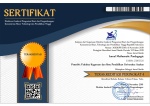Meningkatkan Hasil Belajar Siswa Pada Pokok Bahasan Bilangan Pangkat Dua Dengan Model Pembelajaran Open-Ended
Abstract
Full Text:
PDFReferences
DAFTAR PUSTAKA
Aqib, Zainal, dkk. 2009. Penelitian Tindakan Kelas. Jakarta. Bandung: Yrama Widya.
Arikunto, Suharsimi. 2010. Prosedur Penelitian. Jakarta: Rineka Cipta
Arikunto, Suharsimi. 2012. Penelitian Tindakan Kelas. Jakarta: Bumi Aksara.
Daryanto. 2012. Model Pembelajaran Inovatif. Yogyakarta: Gava Media.
Dimyati dan Mudjiono. 2006. Belajar Dan Pembelajaran. Jakarta: Rineka Cipta.
Hamalik, Oemar. 2011. Kurikulum dan Pembelajaran. Bandung: Bumi Aksara.
Haris, Abdul, Jihad, Asep. 2013. Evaluasi Pembelajaran. Yogyakarta: Multi Presindo.
.
Sahertian, Piet A. 2010. Konsep Dasar dan Teknik Supervisi Pendidikan Dalam Rangka Mengembangkan Sumber Daya Manusia. Jakarta: Rineka Cipta.
Sanjaya, Wina. 2008. Perencanaan dan Desain Sistem Pembelajaran. Bandung: Kencana.
http://haryanto.blogspot.com / Hakikat Pembelajaran Matematika. Diakses pada tanggal 10 Oktober 2019
Sugiyono. 2017. Metode Penelitian Pendidikan Kuantitatif, kualitatif dan
R&D,Bandung : Alfabeta.
Slameto. 2013. Belajar dan Faktor-Faktor yang Mempengaruhi. Jakarta: Rineka Cipta
Suharsimi Arikunto. 2015. Penilitian Tindakan Kelas. Jakarta: Bumi Aksara
Sudjana .2013.Penilaian Hasil Proses Belajar Mengajar. Bandung: PT. Remaja Rosda karya
Wina Sanjaya. 2010. Strategi Pembelajaran. Bandung: Kencana Prenada Media Group
Zainal Aqib, dkk. 2011. Penelitian Tindakan Kelas. Bandung: CV. Rama Widya
DOI: https://doi.org/10.36294/jmp.v4i2.1075
Refbacks
- There are currently no refbacks.





